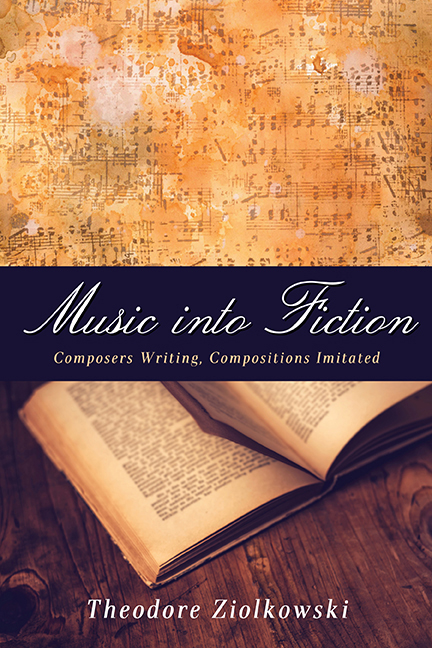Book contents
- Frontmatter
- Dedication
- Contents
- Preface
- Prelude: Introduction
- First Movement: Composers Writing
- 1 Weber and Hoffmann
- 2 Berlioz and Schumann
- 3 Wagner
- 4 Transition: Nietzsche and the Post-Wagnerians
- 5 Burgess
- Second Movement: Compositions Imitated
- Finale: Composers Setting Fictional Compositions
- Coda: Conclusion
- Bibliography
- Index
5 - Burgess
from First Movement: Composers Writing
Published online by Cambridge University Press: 09 May 2017
- Frontmatter
- Dedication
- Contents
- Preface
- Prelude: Introduction
- First Movement: Composers Writing
- 1 Weber and Hoffmann
- 2 Berlioz and Schumann
- 3 Wagner
- 4 Transition: Nietzsche and the Post-Wagnerians
- 5 Burgess
- Second Movement: Compositions Imitated
- Finale: Composers Setting Fictional Compositions
- Coda: Conclusion
- Bibliography
- Index
Summary
Burgess as Musician
Like E. T. A. Hoffmann, Anthony Burgess (1917–93) considered himself primarily a composer before turning in his thirties to the writing that was to establish his reputation. Throughout his life he repeatedly remarked that he would prefer to be viewed as a musician who writes novels rather than as a novelist who composes music. Yet again, as in the case of Hoffmann, despite an appreciative entry in The New Grove Dictionary of Music and Musicians, most people still know his name only as a writer. The lengthy entry on Burgess in a standard reference work on British writers mentions in passing only his early interest in music and fails to cite his compositions or to discuss the influence of music in his novels, as is also the case in the Twayne biography and the essays in the series “Modern Critical Views.” Even Paul Phillips, a musicologist and author of a thorough study of “the music and literature of Anthony Burgess,” admits that he was unaware of Burgess's musical achievements until they were mentioned in his New York Times obituary. To heighten the irony: although Burgess was already one of the most prolific writers in contemporary English letters, his name was relatively unknown until 1971, when Stanley Kubrick's film of A Clockwork Orange opened. Burgess notes the further paradox that he “secured a musical hearing through the practice of a different art”: thanks to the musical structure of his novel Napoleon Symphony (1974) he was invited to write a major composition for the orchestra at the University of Iowa, his Symphony No. 3 in C, the performance of which offered him the first occasion to hear one of his major works in concert. To be sure, the situation today is somewhat better, thanks to Phillips's book and a recent collection of essays on music and literature in Burgess's work.
- Type
- Chapter
- Information
- Music into FictionComposers Writing, Compositions Imitated, pp. 111 - 130Publisher: Boydell & BrewerPrint publication year: 2017

